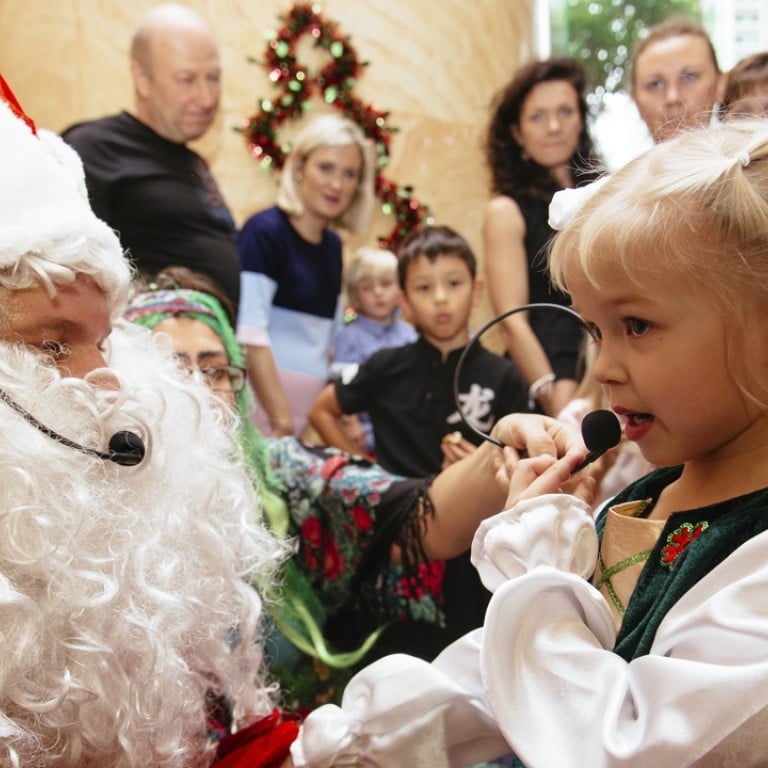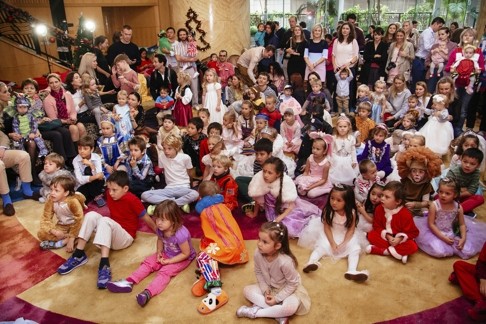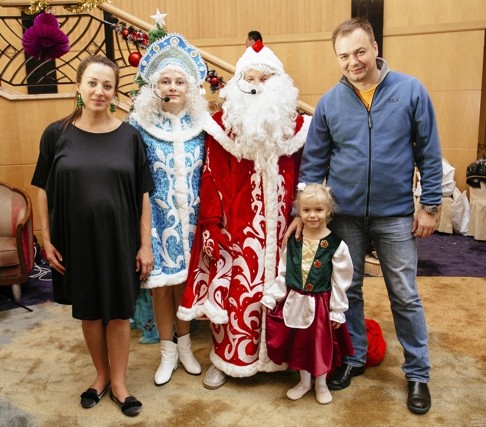
How Hong Kong’s expatriate communities keep Christmas traditions alive far from home
For Germans and Swedes the holiday mood starts with Advent, for Brazilians there’s a feast and new clothes, the French prepare 13 desserts, while Russian speakers wait for Uncle Frost to arrive
Christmas celebrations begin early for teacher Andrea Springmann. On the first Sunday in December, she places an Advent wreath with four large candles on her coffee table to signal the start of festivities. After a special breakfast, she lights the first candle and her children open the first window of their chocolate-filled Advent calendars.
Then they light another candle every Sunday until all four candles on the Advent wreath are lit. Advent, which means “arrival” or “coming” is a tradition followed by many families in her native Germany and Springmann’s family try to keep it in their adopted home, too.
SEE ALSO: When Christmas in Hong Kong made a change from steaming tropics
“It is very important to us to celebrate Christmas the German way,” says Springmann, who came to Hong Kong about seven years ago to join her husband. “We want our children, who were both born in Hong Kong, to know our traditions and how we experienced Christmas back home.”
Her children particularly enjoy the ritual of placing a pair of freshly polished shoes outside their bedroom door on the night of December 5, the eve of St Nicholas Day. If they’ve been good, St Nicholas will leave them sweets and a toy. But if they’ve been naughty, his assistant Knecht Ruprecht will drop a piece of coal in their shoes – something Springmann has not resorted to.
This Christmas Eve, other German friends will join the family in her Mid-Levels home to enjoy their annual feast, followed by Christmas songs and opening of presents, brought by the Christkind, or Christ-child.
No one has a good grasp of the number of expatriates living in Hong Kong. Social indicators point to a rising population although immigration officials only count the number of foreigners physically in the city on the last day of each month (603,229 in December 2012).
A 2013 report by market researcher Finaccord suggested that about 0.6 per cent of the world’s estimated 50 million expatriates live in Kong.
That adds up to about 301,000 people, and the various nationalities bring a diverse mix to the Christmas festivities.
Helena Storm, Sweden’s recently appointed consul general to Hong Kong and Macau, also welcomes the Christmas season by lighting Advent candles. And having moved here three months ago, Storm and her family looked forward to experiencing the local Swedish community’s choir performances to celebrate the Feast of Saint Lucy (St Lucy’s Day), signalling the arrival of Christmastide.

“Lucia is one of the foremost cultural celebrations in Sweden,” she explains. “It is said to represent an ancient mythical figure bearing light in the middle of the dark, Swedish nights. According to tradition, Lucia is to wear ‘light in her hair’ and each of her handmaidens carries a candle. The star boys, all dressed in white like the handmaidens, wear tall paper cones on their head.”
This Christmas, however, Storm won’t be joining the small community of about 1,500 Swedes in Hong Kong. She and her family will return to Sweden, where they will stay home to await the arrival of Santa Claus with his gifts and enjoy a smorgasbord buffet.

Susy Goncalves Chicota, a member of a Facebook community of Brazilians in Hong Kong called Clube da Luluzinha, says women in Brazil typically spend all day on December 24 preparing a feast. It’s an elaborate banquet made up of pork, turkey and chicken dishes, rice, savoury cakes and desserts – all of which can only be eaten after midnight.
“If I close my eyes I can remember the smells wafting from the kitchen, the sounds of their voices as they discuss recipes and the laughter of children running around with grandma scolding them,” Chicota says.
In Hong Kong, she tries to replicate the atmosphere for her family: “I cook all the dishes and celebrate the way my grandmother and mother taught me. This way, my daughter will also learn our rituals.”
In line with tradition, Chicota and her family wear new clothes to celebrate Christmas. Their Brazilian friends usually arrive with gifts, which are placed under the Christmas tree. They dance and play with the children until midnight, when they greet each other, exchange gifts and sit down to eat.
But the Brazilian custom of neighbours visiting each other to eat, drink and dance until the sun comes up on Christmas day, simply isn’t an option in Hong Kong, she says.
For Estelle Hu-Pirot of HK Accueil, a non-profit that organises activities for the French community, Christmas in France is a family celebration that is always held in the home.
In Hong Kong, however, she and her husband Vincent Pirot always invite “the family we chose” of closest friends for a festive home-cooked dinner.
“My in-laws usually come to Hong Kong but if they are not here, we plan a Skype session when everyone is starting the dinner to raise a glass together even when we are miles apart,” says Hu-Pirot.
“It is such an important time of the year for the French. In Hong Kong we start discussing in September who will be around or not [at Christmas].”
A unique French tradition, she adds, is the 13 desserts, which are placed on the table after a big supper.
“And of course, no Christmas is complete without champagne. For it to feel like Christmas you need to have a combination of people close to your heart, foie gras, champagne, a Christmas tree and gifts,” says Hu-Pirot, who founded the Maman in the City website.

But while many nationalities wind down after Christmas before focusing on New Year parties, festivities among Russian speakers lead up to the New Year, says Nataliia Bezverkha.
President of Ladushki, a non-profit for Russian-speaking families, Bezverkha says their New Year traditions are much like Christmas rituals in other countries.
“It is impossible to think of our New Year celebrations without a Christmas tree – that is the place where kids eagerly open their presents on New Year’s Day,” she says.
“Traditionally, the father brings back a tree from the market on December 30. We all enjoy a feast with family and friends and at 12 beats of the clock, we drink a mandatory glass of champagne and make a wish,” says Bezverkha, who is originally from Ukraine.
Uncle Frost, a kindly, white-bearded sorcerer dressed in a long fur coat of white, blue or red, and his granddaughter Snow Maiden, bring gifts for the kids.
This year, children met the pair and enjoyed a magic show, special performances and treats at Ladushki’s annual New Year carnival, which Bezverkha has been organising since 2008.

As Russia follows the Julian calendar for traditional holidays, Christmas is celebrated on January 7. To honour each of the 12 apostles, it is common to have 12 dishes at the Christmas table, and guests must try at least a spoonful of every dish, she explains.
“There should be no alcohol, meat or cream and if a visitor comes, you must invite him to your table. It is custom to give food to everyone at Christmas,” she says.
Bezverkha, who is expecting her second daughter on December 25, believes it is important for her children to learn their native language and culture.
“The number of families in the Ladushki group has grown from 70 to 350 in the past two years. We come from different places but we all speak Russian. This shows the importance of community,” she says. “We support each other, celebrate holidays and common tradition and in doing so, we fulfil a mother’s mission to pass traditions from one generation to the next.”

